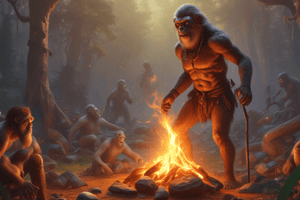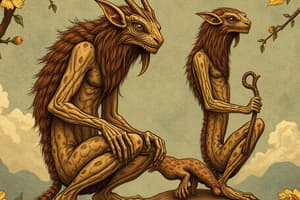Podcast
Questions and Answers
What is the period during which the earliest hominids are believed to have lived?
What is the period during which the earliest hominids are believed to have lived?
- 1 million years ago
- 4 million years ago (correct)
- 500,000 years ago
- 2 million years ago
Homo habilis is known as 'handy human' due to its use of fire.
Homo habilis is known as 'handy human' due to its use of fire.
False (B)
Who were the researchers that discovered a significant hominid in East Africa?
Who were the researchers that discovered a significant hominid in East Africa?
Mary and Louis Leakey
Scientists used ___________ dating to determine the ages of artifacts and fossils.
Scientists used ___________ dating to determine the ages of artifacts and fossils.
Match the following hominids with their associated characteristics:
Match the following hominids with their associated characteristics:
Which method is NOT mentioned for analyzing prehistoric times?
Which method is NOT mentioned for analyzing prehistoric times?
Anthropology focuses on studying past societies through written records.
Anthropology focuses on studying past societies through written records.
What is the term for human-like creatures that walked upright?
What is the term for human-like creatures that walked upright?
What does Homo sapiens sapiens mean?
What does Homo sapiens sapiens mean?
Homo sapiens emerged approximately ___________ years ago.
Homo sapiens emerged approximately ___________ years ago.
Stone tools were significant for early humans as they relied on them for sustenance.
Stone tools were significant for early humans as they relied on them for sustenance.
Which of the following is a primary focus of archaeology?
Which of the following is a primary focus of archaeology?
What major discovery provided early humans with warmth and the ability to cook food?
What major discovery provided early humans with warmth and the ability to cook food?
Around 8000-5000 B.C., agriculture spread and developed in __________.
Around 8000-5000 B.C., agriculture spread and developed in __________.
Match the following discoveries or advancements with their significance:
Match the following discoveries or advancements with their significance:
What was a key feature of the Neolithic Revolution?
What was a key feature of the Neolithic Revolution?
Homo sapiens left Africa only after the extinction of Neanderthals.
Homo sapiens left Africa only after the extinction of Neanderthals.
What two Neolithic farming villages grew rapidly during the advancement of agriculture?
What two Neolithic farming villages grew rapidly during the advancement of agriculture?
The invention of the __________ increased the accuracy of hunting.
The invention of the __________ increased the accuracy of hunting.
What advantage did the use of metals provide to early humans?
What advantage did the use of metals provide to early humans?
What geographical feature provided ancient Egyptians with natural transport and communication routes?
What geographical feature provided ancient Egyptians with natural transport and communication routes?
The Fertile Crescent is known for its annual flooding, which helped in agriculture.
The Fertile Crescent is known for its annual flooding, which helped in agriculture.
What was the primary belief system of the Sumerians in ancient Mesopotamia?
What was the primary belief system of the Sumerians in ancient Mesopotamia?
The ancient Egyptians used _______ and hieratic writing for different purposes.
The ancient Egyptians used _______ and hieratic writing for different purposes.
Match the following civilizations with their key characteristics:
Match the following civilizations with their key characteristics:
Which class was NOT part of the social structure in early civilizations?
Which class was NOT part of the social structure in early civilizations?
Rulers in ancient civilizations primarily focused on artistic expression rather than governance.
Rulers in ancient civilizations primarily focused on artistic expression rather than governance.
What was the purpose of the rituals that early civilizations performed?
What was the purpose of the rituals that early civilizations performed?
The primary rivers supporting Mesopotamian civilization were the _______ and _______.
The primary rivers supporting Mesopotamian civilization were the _______ and _______.
Which of the following was an accomplishment of the ancient Egyptians?
Which of the following was an accomplishment of the ancient Egyptians?
Which kingdoms were established following the death of Alexander?
Which kingdoms were established following the death of Alexander?
Augustus, also known as Caesar, accepted the title of dictator for life without any opposition.
Augustus, also known as Caesar, accepted the title of dictator for life without any opposition.
What was the primary reason for the conflict between Pompey and Caesar?
What was the primary reason for the conflict between Pompey and Caesar?
The First Punic War was fought between Rome and ________ for control of the western Mediterranean.
The First Punic War was fought between Rome and ________ for control of the western Mediterranean.
Match the following figures with their contributions:
Match the following figures with their contributions:
What was one of the key features of Rome's geography that contributed to its development?
What was one of the key features of Rome's geography that contributed to its development?
The Hellenistic kingdoms relied heavily on local populations to form their ruling class.
The Hellenistic kingdoms relied heavily on local populations to form their ruling class.
What major event did Augustus initiate by declining to step down from power?
What major event did Augustus initiate by declining to step down from power?
The First Triumvirate was formed by Crassus, Pompey, and _________.
The First Triumvirate was formed by Crassus, Pompey, and _________.
Which of the following leaders was murdered due to concerns over his growing power?
Which of the following leaders was murdered due to concerns over his growing power?
What was the primary function of the Spartan government?
What was the primary function of the Spartan government?
Athens was ruled by kings until the 7th century when they became a democracy.
Athens was ruled by kings until the 7th century when they became a democracy.
Who ended land debt and freed enslaved people in Athens?
Who ended land debt and freed enslaved people in Athens?
The number of troops sent by Persia in the Persian War was __________.
The number of troops sent by Persia in the Persian War was __________.
Match the following historical figures with their associated actions:
Match the following historical figures with their associated actions:
What did the Greeks and Spartans do to achieve victory against Persia?
What did the Greeks and Spartans do to achieve victory against Persia?
The Hellenistic culture was solely based on Greek traditions.
The Hellenistic culture was solely based on Greek traditions.
At what age did Alexander the Great die?
At what age did Alexander the Great die?
The Phoenician alphabet was later __________ by the Greeks.
The Phoenician alphabet was later __________ by the Greeks.
What was a notable characteristic of Spartan society?
What was a notable characteristic of Spartan society?
Which civilization is known for its urban planning and advanced sanitation systems?
Which civilization is known for its urban planning and advanced sanitation systems?
Judaism was the first religion to worship multiple gods.
Judaism was the first religion to worship multiple gods.
What was the significance of monsoons to India?
What was the significance of monsoons to India?
The alphabet used today was made by the __________.
The alphabet used today was made by the __________.
Match the following geographical features with their descriptions:
Match the following geographical features with their descriptions:
Which of the following statements about Ancient Greece is true?
Which of the following statements about Ancient Greece is true?
The climate in China was influenced only by seasonal variations.
The climate in China was influenced only by seasonal variations.
How did Judaism influence later religions?
How did Judaism influence later religions?
The __________ valleys along the Huang He and Chang Jiang were significant food-producing areas.
The __________ valleys along the Huang He and Chang Jiang were significant food-producing areas.
What caused the decline during the Dark Ages in Ancient Greece?
What caused the decline during the Dark Ages in Ancient Greece?
Flashcards
Homo sapiens sapiens
Homo sapiens sapiens
The species known as Homo sapiens sapiens, emerged 200,000 years ago and spread across the globe, replacing Neanderthals.
Neolithic Revolution
Neolithic Revolution
The transition from hunter-gatherer lifestyle to a settled agricultural existence.
Fire
Fire
A major discovery that provided warmth, protection, and allowed for cooking and roasting food.
Stone Tools
Stone Tools
Signup and view all the flashcards
Systematic Agriculture
Systematic Agriculture
Signup and view all the flashcards
Cities
Cities
Signup and view all the flashcards
Early Human Travel
Early Human Travel
Signup and view all the flashcards
Spread of Homo sapiens sapiens
Spread of Homo sapiens sapiens
Signup and view all the flashcards
Cooking Food
Cooking Food
Signup and view all the flashcards
Use of Metal
Use of Metal
Signup and view all the flashcards
Archaeology
Archaeology
Signup and view all the flashcards
Anthropology
Anthropology
Signup and view all the flashcards
Early Hominids
Early Hominids
Signup and view all the flashcards
Homo Habilis
Homo Habilis
Signup and view all the flashcards
Homo Erectus
Homo Erectus
Signup and view all the flashcards
Homo Sapiens
Homo Sapiens
Signup and view all the flashcards
Radiocarbon Dating
Radiocarbon Dating
Signup and view all the flashcards
Thermoluminescence
Thermoluminescence
Signup and view all the flashcards
Microscopic and Biological Analysis
Microscopic and Biological Analysis
Signup and view all the flashcards
Written Records
Written Records
Signup and view all the flashcards
Phoenician Alphabet
Phoenician Alphabet
Signup and view all the flashcards
Greek Alphabet
Greek Alphabet
Signup and view all the flashcards
Roman Alphabet
Roman Alphabet
Signup and view all the flashcards
Judaism's Monotheism
Judaism's Monotheism
Signup and view all the flashcards
Judaism's Beliefs
Judaism's Beliefs
Signup and view all the flashcards
Judaism and Separation
Judaism and Separation
Signup and view all the flashcards
Judaism's Influence
Judaism's Influence
Signup and view all the flashcards
Indus Valley Features
Indus Valley Features
Signup and view all the flashcards
Indus Valley Power
Indus Valley Power
Signup and view all the flashcards
India's Geography & Climate
India's Geography & Climate
Signup and view all the flashcards
Government Role in Early Civilizations
Government Role in Early Civilizations
Signup and view all the flashcards
Social Structure in Early Civilizations
Social Structure in Early Civilizations
Signup and view all the flashcards
Religion's Role in Early Civilizations
Religion's Role in Early Civilizations
Signup and view all the flashcards
Writing in Early Civilizations
Writing in Early Civilizations
Signup and view all the flashcards
Art in Early Civilizations
Art in Early Civilizations
Signup and view all the flashcards
Fertile Crescent
Fertile Crescent
Signup and view all the flashcards
Ancient Mesopotamia and the Sumerians
Ancient Mesopotamia and the Sumerians
Signup and view all the flashcards
The Nile River's Importance in Ancient Egypt
The Nile River's Importance in Ancient Egypt
Signup and view all the flashcards
Religion in Ancient Egypt
Religion in Ancient Egypt
Signup and view all the flashcards
Accomplishments of Ancient Egyptians
Accomplishments of Ancient Egyptians
Signup and view all the flashcards
Iron tools in Ancient Greece
Iron tools in Ancient Greece
Signup and view all the flashcards
Greek adoption of the Phoenician alphabet
Greek adoption of the Phoenician alphabet
Signup and view all the flashcards
Characteristics of ancient Sparta
Characteristics of ancient Sparta
Signup and view all the flashcards
Government of ancient Sparta
Government of ancient Sparta
Signup and view all the flashcards
Characteristics of ancient Athens
Characteristics of ancient Athens
Signup and view all the flashcards
Draco and Solon in ancient Athens
Draco and Solon in ancient Athens
Signup and view all the flashcards
Cleisthenes' contribution to Athenian democracy
Cleisthenes' contribution to Athenian democracy
Signup and view all the flashcards
Alexander the Great and his conquests
Alexander the Great and his conquests
Signup and view all the flashcards
Hellenistic culture
Hellenistic culture
Signup and view all the flashcards
Troop Numbers in the Persian War
Troop Numbers in the Persian War
Signup and view all the flashcards
Alexander's Empire after his death
Alexander's Empire after his death
Signup and view all the flashcards
Who governed the Hellenistic Kingdoms?
Who governed the Hellenistic Kingdoms?
Signup and view all the flashcards
Rome's Geographic Advantages
Rome's Geographic Advantages
Signup and view all the flashcards
The Origins of Rome's People
The Origins of Rome's People
Signup and view all the flashcards
Augustus' Rise and Fall
Augustus' Rise and Fall
Signup and view all the flashcards
The First Triumvirate
The First Triumvirate
Signup and view all the flashcards
The First Punic War
The First Punic War
Signup and view all the flashcards
Factors in Rome's Growth
Factors in Rome's Growth
Signup and view all the flashcards
The First Triumvirate - Transition to Empire
The First Triumvirate - Transition to Empire
Signup and view all the flashcards
Punic Wars and Roman Expansion
Punic Wars and Roman Expansion
Signup and view all the flashcards
Study Notes
World Cultures and History Midterm Study Guide
-
Chapter 1: The Rise of Civilizations (Additional Study Aid: Jeopardy)
- Prehistory/Early Development: Historians used written records, documents, radiocarbon dating, thermoluminescence, and other analyses to study the past.
- Archaeology involves studying artifacts (tools, weapons, pottery) to understand early societies' social and military structures. Diet and daily activities can also be inferred from bones and artifacts.
- Anthropology uses artifacts and fossils to learn about human life and cultures, often creating a picture of average daily life.
-
Types of Hominids
- Mary and Louis Leakey, through research, discovered hominids in East Africa (1.8 million years old).
- Early hominids: Human-like creatures that walked upright and lived around 4 million years ago.
- Homo Habilis: More advanced hominids, with larger brains, are believed to have used stone tools.
-
Homo Erectus
- Hominids emerged approximately 1.5 million years ago, having physical proportions similar to modern humans.
- Were the first hominins to leave Africa.
-
Homo Sapiens
- Evolved roughly 250,000 years ago; characterized as "wise humans".
- Mastered fire.
-
Homo Sapiens Sapiens
- Evolved roughly 200,000 years ago
-
Importance of Stone Tools
- Paleolithic people made implements from stone, supporting themselves, and developing more advanced weapons over time. Fire was also crucial for survival and nutrition.
-
Systematic Agriculture
- Replaced nomadic living; civilizations developed where crops were cultivated and people settled. Approximately 8000-5000 B.C.
-
Chapter 2: The Spread of Civilizations (Additional Study Aid: Jeopardy)
-
Ancient Egypt (Geography)
- The Nile River provided transportation, communication, and protection from invaders; fertile farmland due to annual floods.
-
Ancient Egyptian Achievements
- Polytheistic religion, pyramids, temples, sculptures, mathematics, geometry, and a 365-day calendar were significant developments. Hieroglyphics and hieratic scripts are important aspects of communication.
-
Phoenicians Alphabet
-
Developed a simplified alphabet with 22 signs, which influenced the Greek and Roman alphabets.
-
Religion and Judaism
- Judaism was the first monotheistic religion, centered on the worship of one god. The Jews believed in a covenant between themselves and God.
-
Chapter 3: Ancient Greece
- Greece's Geography and Climate
- Mountains, seas, and islands were characteristic of Greece, leading to isolation from other civilizations.
- Characteristics of the Dark Ages in ancient Greece
- Mycenaean collapse led to hardship, forcing people to migrate. Iron tools led to more efficient farming practices.
- Characteristics of Sparta and Athens
- Sparta was a military state, with an oligarchical government composed of two kings, and citizen involvement in governing was limited
- Athens, initially ruled by kings, eventually shifted to a democracy, emphasizing the military prowess of its citizens. Solon and Cleisthenes were major reformers.
- Greece's Geography and Climate
-
Persian Wars
- Greece and Sparta united against a Persian invasion.
-
Chapter 4: Ancient Rome (Study Guide/Cheatsheet)
-
Ancient Rome's Geography and Climate
- Rome's location on the Italian peninsula was advantageous for trade and defense. The presence of the Tiber River offered access to water and a natural border.
-
Augustus
- First Emperor of Rome. Became dictator for life, establishing the Roman Empire.
-
The First and Second Triumvirates
- First: Crassus, Pompey, and Caesar formed an alliance (3-men rule) causing a civil war after the death of Crassus.
- Second: Octavian, Antony, and Lepidus formed an alliance; the struggle for power lead to a final civil war, ending in Octavian's victory and becoming the first Roman emperor.
Studying That Suits You
Use AI to generate personalized quizzes and flashcards to suit your learning preferences.




